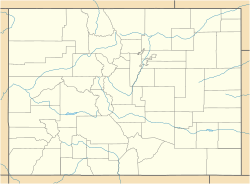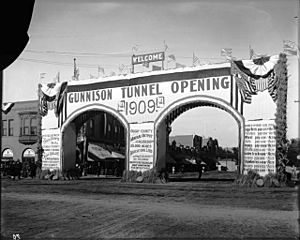Gunnison Tunnel facts for kids
Quick facts for kids |
|
|
Gunnison Tunnel
|
|
| Location | Montrose County, Colorado, USA |
|---|---|
| Nearest city | Montrose, Colorado |
| Area | 373.3 acres (151.1 ha) |
| Built | 1901 |
| Built by | U.S. Reclamation Service |
| NRHP reference No. | 79000616 |
| Added to NRHP | July 22, 1979 |
The Gunnison Tunnel is a very important tunnel built in Colorado. It was constructed between 1905 and 1909. This tunnel helps bring water from the Gunnison River to a dry area called the Uncompahgre Valley. This valley is near the town of Montrose, Colorado. The tunnel is about 5.8 miles long. It was built by the U.S. Bureau of Reclamation, which is a government agency that manages water resources.
Contents
Building the Gunnison Tunnel
When it was finished, the Gunnison Tunnel was the longest irrigation tunnel in the world! It quickly helped turn the dry land around Montrose into rich farmland. This meant farmers could grow many more crops.
The Big Idea
The idea for this amazing tunnel came from a miner and prospector named Frank Lauzon. By the early 1890s, he was farming in Montrose. People say he dreamed that water from the Gunnison River should come to the valley. This dream inspired the huge project.
New Tools for Construction
Building the tunnel was a massive job. Workers used new technology to make it safer and easier.
- Jackhammers fed by air compressors replaced old hand drills. These new tools made it much faster to create holes for blasting.
- Dynamite was used instead of black powder for blasting. Dynamite was more powerful and safer.
By 1906, shifts of up to 30 workers were busy inside the tunnel at one time.
A Historic Opening
The Gunnison Tunnel officially opened in 1909. It was a huge celebration! The President of the United States, William Howard Taft, even came to the dedication ceremony. This showed how important the tunnel was for the country.
Tunnel Facts and Figures
The tunnel is about 5.8 miles (9.3 km) long. It has a special shape inside, about 11 by 12 feet (3.4 m × 3.7 m) across. The bottom has square corners, and the roof is arched. The tunnel slopes down about 40 feet (12 m) from one end to the other. At its deepest point, the tunnel is about 2,200 feet (670 m) below the surface of Vernal Mesa.
A Landmark of Engineering
The Gunnison Tunnel is not just a useful structure; it's also a historic one! In 1972, the American Society of Civil Engineers (ASCE) named it a National Civil Engineering Landmark. This means it's recognized as a very important achievement in engineering. In 1979, it was also added to the National Register of Historic Places. This list includes places that are important to the history of the United States.




